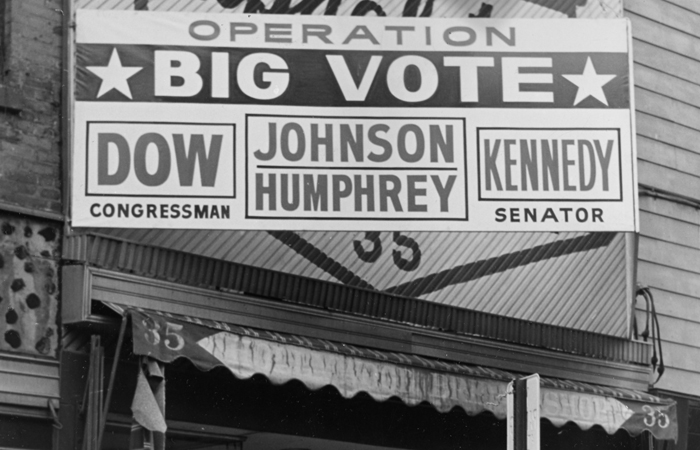The International Union of Electronic, Electrical, Technical, Salaried, and Machine workers document the day-to-day operations of the first 41 years of this community organization founded in 1944.
Collections : [New York State Modern Political Archive]
New York State Modern Political Archive
Elected officials, interest groups, and activists from New York State.
The New York State Modern Political Archive (NYSMPA) was established in 1982 to document the work of individuals and private interest groups concerned with New York State public policy issues in the 20th century. Originally named the Archives of Public Affairs and Policy, the NYSMPA collects, preserves, and facilitates access to primary sources pertaining to New York State public affairs and policy, and now includes the personal papers of members of the gubernatorial administrations of Nelson A. Rockefeller; papers of former New York Congressional members and elected officials who served in New York State Legislature; and the official records and papers of numerous private groups, professional associations, individuals, public-sector labor unions, community groups, and other organizations concerned with Empire State public-policy issues.
Search Constraints
Start Over You searched for: Collecting Area New York State Modern Political Archive Remove constraint Collecting Area: New York State Modern Political Archive Subject Minutes Remove constraint Subject: Minutes Date range 1960 to 1964 Remove constraint Date range: <span class="from" data-blrl-begin="1960">1960</span> to <span class="to" data-blrl-end="1964">1964</span>Search Results
Jackson Davis Papers, 1952-1997 9.83 cubic ft.
The papers of Jackson Davis document his environmental activism and work with environmental organizations.
This is a repository of the minutes and records of the local chapter 157 of the Laborers' International Union of North America.
League Of Women Voters of Albany County Records, 1940-2001 31.47 cubic ft.
The records of the League of Women Voters of Albany County (LWVAC), include material produced by the LWVAC as well as material that was produced by the League of Women Voters of New York State and the League of Women Voters of the United States. The most comprehensive series in the collection is the Administrative Files. There are meeting minutes, annual reports, and Board of Directors lists from 1940-2001. A large portion of the LWVAC collection relates to the two main purposes of the organization: voter service and "study and action." Records relating to voter service include pamphlets with information about candidates and citizen voting rights published by the LWVAC and material used to increase voter participation. Records related to "study and action" include material used by the LWVAC to inform citizens about public policy issues locally, statewide, and nationally. A strength of the LWVAC collection is the amount of material related to various public policy issues and how they affected the local community.
The League of Women Voters of Rensselaer County Records documents the political and social activities of the chapter since its founding in 1939.
Malcolm Willison Papers, 1958-1997 14.9 cubic ft.
This collection details the social activism of Malcolm Willison in New York State's Capital Region. As an active board member of several local groups, his papers contain minutes, financial statements and budgets, programming ideas, brochures, planning notes, articles and reports, and clippings that detail the evolution of the various organizations contained in the collection. Organizational newsletters and event flyers, course and conference information planned by Willison in his capacity on executive boards, and vast amounts of correspondence about any number of events and issues are also part of the scope of the collection.
M.C. Lawton Civic and Cultural Club Records, 1921-2004 1.13 cubic ft.
The M.C. Lawton Civic and Cultural Club Records showcase the operations of the first black organization in Albany that was actively involved in community service and educational advancement, which was founded in 1919.
Monday Musical Club Records, 1924-1988 15.02 cubic ft.
The Monday Music Club was formed in 1904 among twenty women, to practice their music skills. The women practiced their skills in workshops and other artistic excerices. Even though they were founded in 1904, the collection does not cover the first twenty years of the club.
The NAACP Schenectady Branch Records document concerns for discrimination in housing and employment and for the recruitment of black professionals from colleges and universities to the area. The records also show the Branch's involvement with area social service providers, labor unions, and other community organizations, as well as with General Electric, as the area's major employer.
Nancy Papish Papers, 1953-2001, bulk 1970-1994 11.0 cubic ft.
The papers of Nancy Papish document her involvement with Clearwater, North River Friends of Clearwater (NRFC), and the campaign to stop Hydro-Quebec's development plan for James Bay. These papers document the environmental activism of Nancy Papish from the 1970s through the 1990s. Included are meeting minutes, notes, mailings, press releases, news clippings, magazine articles, programs, and publications. The Clearwater files contain near-complete runs of newsletters produced by both NRFC and the parent Clearwater organization. Evidence of NRFC's outreach activities is found in a slide show titled "This Is Clearwater" and numerous poster displays. Documentation of Clearwater's organization and administration, such as meeting minutes, internal reports, and committee files, are almost entirely absent. There is little information about the membership of Clearwater. The James Bay files contain materials from several organizations.
